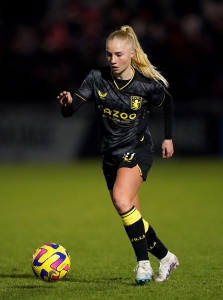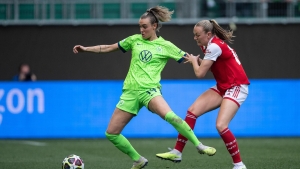Chelsea broke the Women’s Super League transfer record even as their men’s team sat out the January window.
While Premier League spending was down across the board to a combined £100m over the month, compared to last year’s record £815m as estimated by finance company Deloitte, an increasingly active WSL market peaked with the Blues’ move for Colombia forward Mayra Ramirez.
An initial 450,000 euros (£384,000), as stated by selling club Levante, is the English top flight’s highest ever fee – with add-ons worth 50,000 euros (£42,600) making it a potential world record in the women’s game.
Ramirez was recruited to cover for Sam Kerr’s expected season-long ACL absence while Manchester City replaced the similarly injured Jill Roord with Aston Villa’s Laura Blindkilde Brown.
With WSL sides increasingly following the lead of the men’s game in turning to the transfer market in response to injuries, Calum Ross, assistant director in Deloitte’s Sports Business Group, told the PA news agency: “Player trading is a key part of any club’s business model, whether that’s in the women’s game or the men’s game.
“Obviously at the moment the values that we’re looking at are a lot more modest in the women’s game but we’d expect to see that growing in line with revenue.
“They’re all positive changes for the women’s game and it’s exciting to see that, and hopefully it does deliver the growth that it really deserves and is capable of.”
After lavish spending in recent windows, Chelsea were one of five men’s Premier League sides not to make a single January addition along with Arsenal, Everton, Liverpool and Manchester United.
The slowdown has been attributed to the threat of sanctions under the league’s profit and sustainability rules, with the Toffees already docked 10 points this season – though spending over the full season still hit £2.4bn, second only to last season’s £2.7bn.
Ross said: “I think compliance with financial regulations is a key part of it.
“We’ve obviously seen the Premier League’s response to breaches of their regulations, which is heightening clubs’ awareness to comply, and it’s the first year of UEFA’s new squad cost rules for clubs participating in UEFA competitions.
“There’s other reasons as well. In the summer we saw transfers like (Jude) Bellingham, (Declan) Rice, (Harry) Kane, which then create that domino effect across the market. We’re probably seeing a moment to pause and reset after they’ve done a lot of that business in the summer.”
Only £30m was spent on deadline day on permanent moves into the Premier League, the majority of that money heading into the Sky Bet Championship as Crystal Palace signed Adam Wharton from Blackburn and Aston Villa brought in Middlesbrough’s Morgan Rogers. Radu Dragusin’s move to Tottenham for a reported £26.7m on January 11 remained the biggest of the month.
For the first time since the Chinese Super League boom of 2019, the Premier League was not the biggest global spender as Ligue 1 clubs in France splashed out 190m euros (£162m) and Brazil’s Serie A over £123m.
The Saudi Pro League was not in that bracket, spending barely £20m after its headline-making summer splurge had echoed that previously seen in China.
Jordan Henderson returned to Europe with Ajax after six months at Al-Ettifaq and other high-profile signings expressed discontent, but Ross said: “I don’t think the bubble’s starting to burst. I think it’s a similar story (to the Premier League) – they’ve invested heavily in the summer and there’s an opportunity in this window to reflect and reset.
“I certainly expect to see them back in the market in the summer, whether that’s to the same levels that we saw this summer is to be seen. It does seem there are strong business plans behind the Saudi Pro League but there obviously is a need for them to prioritise financial sustainability over the long term.”






























